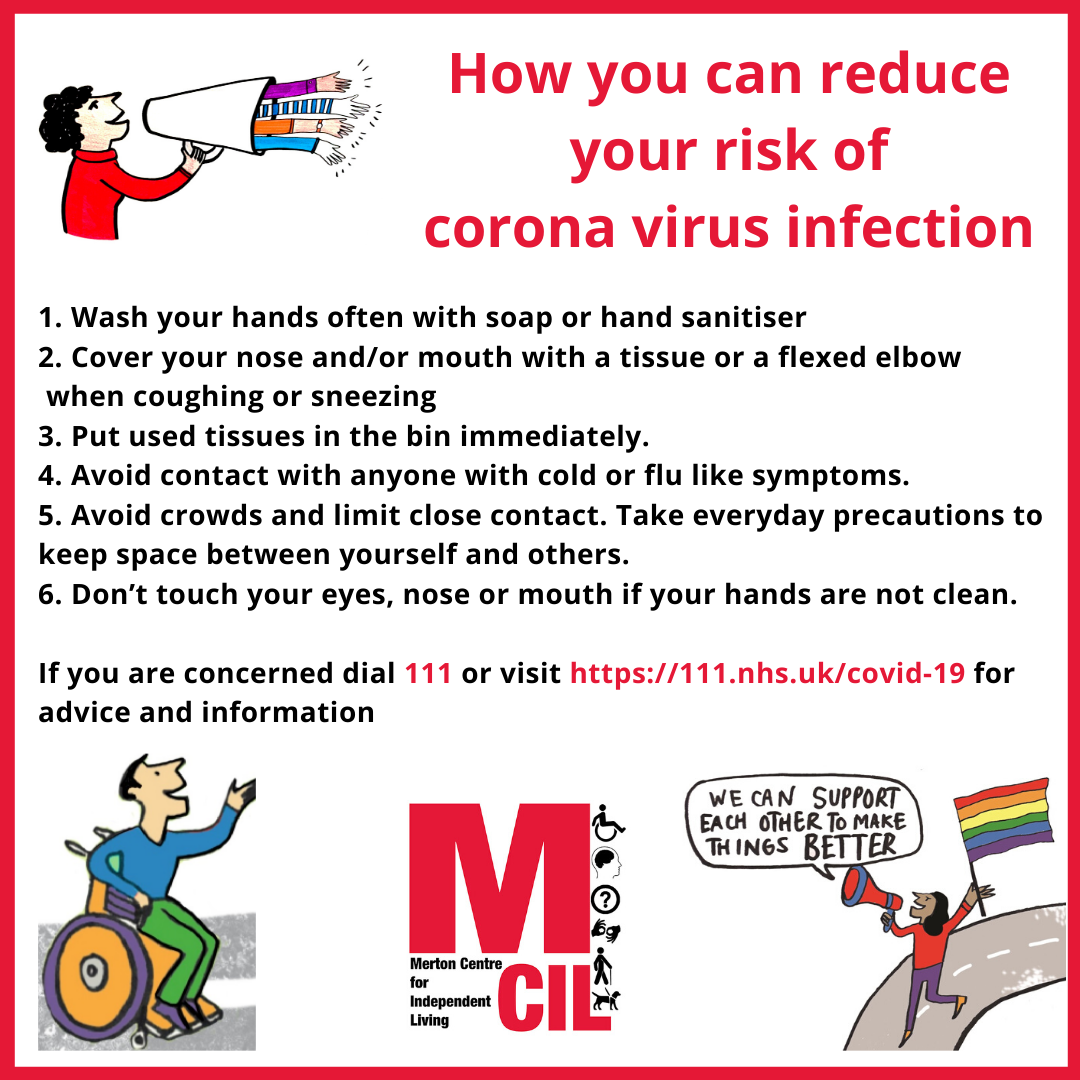Coronavirus - What it means for Disabled People
Information updated on 17th March 2020
If you or a loved one is Disabled, you may be wondering what coronavirus means for you/them.
There are increasing cases of coronavirus in the UK. You can find the most up-to-date information about the coronavirus outbreak on the Government’s website. The situation is developing, and the webpage is updated at 2pm every day - https://www.gov.uk/guidance/coronavirus-covid-19-information-for-the-public
There are things you can do to help you avoid getting coronavirus. Please see our top tips below:
Some Disabled people may be at higher risk of coronavirus. Try and follow these steps to avoid catching or spreading germs:
- Wash your hands often with soap or hand sanitiser
- Cover your nose and/or mouth with a tissue or a flexed elbow when coughing or sneezing
- Put used tissues in the bin immediately.
- Avoid contact with anyone with cold of flu like symptoms.
- Avoid crowds and limit close contact. Take everyday precautions to keep space between yourself and others.
- Don’t touch your eyes, nose or mouth if your hands are not clean.
If you are concerned dial 111 or visit https://111.nhs.uk/covid-19 for advice and information
You can also watch British Sign Language versions of government advice on the SignHealth website - https://www.signhealth.org.uk/coronavirus/
You can also read easy read guidance here - https://bit.ly/39ScXEY
Symptoms
The illness affects the lungs and airways. The symptoms of the coronavirus are similar to some much more common illnesses, such as cold or flu.
The symptoms include:
- A cough
- High temperature
- Shortness of breath
But if you have these symptoms, it doesn’t necessarily mean you have the illness.
What do I do if I am feeling unwell?
As of 12 March, the Government is advising people to stay home for 7 days if they have either or both of the following:
- A high temperature.
- A new, continuous cough.
This is a precaution to try to delay the spread of coronavirus in the UK.
If your symptoms are mild you don't need to contact the NHS. But if your symptoms are getting worse and you reach a point where you would normally call for medical care, you should ring 111 for help. You can also use the NHS specialist online coronavirus service for advice.
If you think you have might have coronavirus don’t go to your doctor’s surgery or hospital. If you need to speak to someone, call 111 and they will make arrangements directly for testing and treatment.
There's advice from the Government on how to manage if you're staying at home - https://www.gov.uk/government/publications/covid-19-stay-at-home-guidance
If you're feeling unwell, it's important to keep practising good hygiene, like washing your hands regularly.
What do I do if I am feeling anxious or worried about coronavirus?
You may be worried about coronavirus and how it could affect you or those that you care about. It's completely understandable to be concerned about the impact coronavirus. Try to stay calm and follow the official advice from the Government. The charity Mind has lots of information that you may find helpful – https://www.mind.org.uk/information-support/coronavirus-and-your-wellbeing/
What to do if you're claiming benefits or asked to go to a medical assessment
Face to face health assessments have been suspended for three months. From Tuesday 17th March, you will no longer be required to attend a face to face health assessment. This also includes universal credit health checks. No further action is required by any claimant as a result of this change. They will be contacted with advice on next steps.
I am waiting for a tribunal date will I be expected to attend the hearing?
During the current phase of the coronavirus outbreak, the business of courts and tribunals continues. Any changes to individual hearings will be communicated directly to those affected in the usual way, usually by email and/or phone.
https://www.gov.uk/guidance/coronavirus-covid-19-courts-and-tribunals-planning-and-preparation
We'll keep updating this page with all the latest information too.
You can download a PDF here - Coronavirus What it means for Disabled People

